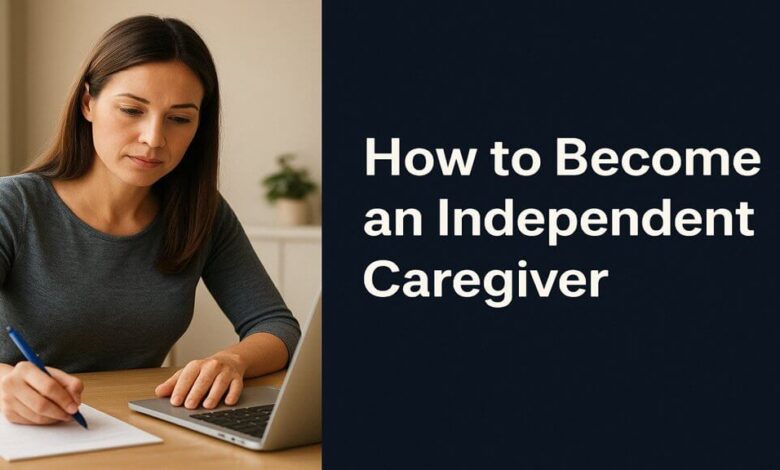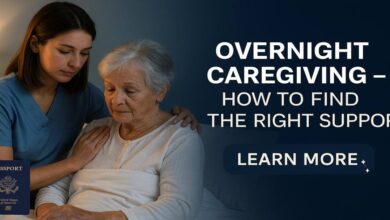
How to Become an Independent Caregiver – Check Here
Becoming an independent caregiver starts with gaining the right skills through training or certification in elderly or personal care. Caregivers then market their services directly to families, often through referrals, online platforms, or local community networks.
Setting fair rates, handling contracts, and managing taxes are essential parts of working independently. With compassion and professionalism, independent caregivers can build strong client relationships and a sustainable career.
Why Caregiver Certification Matters:
Before you start, your first step should be becoming a nationally certified caregiver through the American Caregiver Association (ACA). As the largest certifying organization for caregivers worldwide, ACA certification gives you credibility, trust, and access to resources.
Benefits of Certification:
- Build Client Trust: Families will often ask if you’re certified before hiring. Certification reassures them of your qualifications.
- Provide Peace of Mind: Clients and their loved ones can feel confident you’re trained to deliver high-quality care.
- Establish Credibility: Without certification, clients may doubt your skills and hesitate to hire you.
- Access the National Caregiver Registry: Certification allows your profile to be listed in the registry, which clients use to verify credentials.
Recommended Caregiver Courses:
Option 1: Caregiver Business Bundle ($179)
- National Caregiver Certification Course (120 in-class hours)
- Start Your Own Caregiver Service Business Guide
- Caregiver ID card
- DBA membership with ACA
- National Caregiver Registry status
Option 2: Platinum Plus Caregiver Certification Bundle ($399)
- National Caregiver Certification (120 hours)
- Advanced Caregiver Certification (200 hours)
- Assisted Living Manager Certification (80 hours)
- Certificate in Caregiver Ethics, Personal Development, and Leadership
- Start Your Own Caregiver Service Business Guide
- ACA membership and ID card
- Registry status
Check Also: Can a Caregiver be Charged with Neglect
Action Steps to Launch Your Business:
- Step 1: Choose your certification bundle.
- Step 2: Obtain CPR and First Aid certification ($50–$70).
- Step 3: Complete a TB test ($20–$30).
Setting Rates and Services:
Pricing:
- Weekdays: $15–$20/hr (2-hour minimum)
- Weekends: $20–$30/hr (2-hour minimum)
Typical Services:
- Bathing, dressing, grooming
- Cooking, cleaning, laundry
- Running errands, doctor visits
- Recreational assistance
- Any other agreed-upon care
Building Your Online Presence:
- Buy a domain name (e.g., www.YourCaregiverServices.com).
- Build a website with:
- Mission and vision
- Services and pricing
- Contact info
- Testimonials
- Professional images
- Link to ACA for certification verification
Launching Your Caregiving Journey:
Whether you’re passionate about caregiving for seniors or looking to become a self-employed caregiver, building a career in caregiving can be both fulfilling and financially rewarding. Understanding the essentials from training to business setup can set you apart in this growing field.
Independent Caregiving Tips:
Success as an independent caregiver starts with preparation. Effective independent caregiving tips include:
- Building strong communication and trust with clients.
- Staying organized with schedules, medications, and appointments.
- Continuously updating your skills through workshops or online resources.
- Prioritizing personal well-being to avoid burnout.
Caregiver Training Programs:
Formal education enhances credibility. Caregiver training programs teach essential skills such as first aid, dementia care, and mobility assistance. Completing these programs not only improves client care but also boosts your profile for private caregiver jobs.
Starting and Setting Up a Caregiving Business:
For those ready to go beyond working for an agency, starting a caregiving business offers autonomy and flexibility. Setting up a caregiving business involves:
- Registering your business and obtaining proper licenses.
- Crafting a clear service plan and pricing structure.
- Marketing your services to local communities or through online platforms.
- Ensuring insurance coverage for liability protection.
Finding Private Caregiver Jobs:
Networking and reputation are key to securing private caregiver jobs. Clients value caregivers who are trained, reliable, and compassionate. Word-of-mouth referrals and online caregiver platforms can help you build a steady client base.
Embracing the Self-Employed Caregiver Path:
Being a self-employed caregiver offers freedom to design your schedule and services, but it also requires discipline. Keeping detailed records, managing taxes, and continually honing your skills ensures long-term success in this growing field.
Marketing Your Business:
- Use social media, brochures, and local advertising.
- Start with a modest ad budget ($20–$30/month) and scale as revenue grows.
- Consider Google Ads to reach local clients.
Legal and Business Considerations:
- Business License: Not always required, but it adds credibility. Check local rules.
- Insurance & Bonding: Protects your business and clients.
- Business Structure: Consider an LLC or S-Corp for liability protection and tax benefits. Consult a CPA.
Building a Professional Caregiver Portfolio:
- Use a 1–2 inch binder with tabs for:
- Mission statement & goals
- Resume & references
- Certifications & training
- Services offered & rates
- Keep it professional, simple, and organized to impress potential clients.
Conducting Your Business the Right Way:
- Maintain professionalism in speech and behavior.
- Use courteous communication: “please,” “thank you,” and professional phone greetings.
- Operate ethically, follow the law, and demonstrate genuine care for clients.
Leveraging Your Life Experience:
Your personal and caregiving experiences are valuable. Use lessons learned in life to strengthen your business approach, connect with clients, and enhance your credibility.
Final Action Steps:
- Advertise your caregiver business
- Obtain a business license if required
- Establish a corporation (LLC or S-Corp)
- Build your caregiver portfolio
With commitment, professionalism, and a caring attitude, you can successfully launch and grow your private home care business. Your services matter—not only to your clients but to yourself and your community.
Conclusion:
Launch your private home care business by getting certified, setting fair rates, and building a professional, trustworthy presence. Combine compassion, ethics, and experience to deliver exceptional care. With dedication and organization, you can create a rewarding career that truly makes a difference.
Frequently Asked Questions:
What does an independent caregiver do?
An independent caregiver provides in-home support for clients, including personal care, meal preparation, errands, companionship, and other daily tasks tailored to each client’s needs.
How much can I earn as an independent caregiver?
Rates typically range from $15–$20/hr on weekdays and $20–$30/hr on weekends, depending on experience, services offered, and location.
Do I need certification to work as an independent caregiver?
While not always legally required, certification such as through the American Caregiver Association (ACA) builds trust, credibility, and access to a national caregiver registry.




